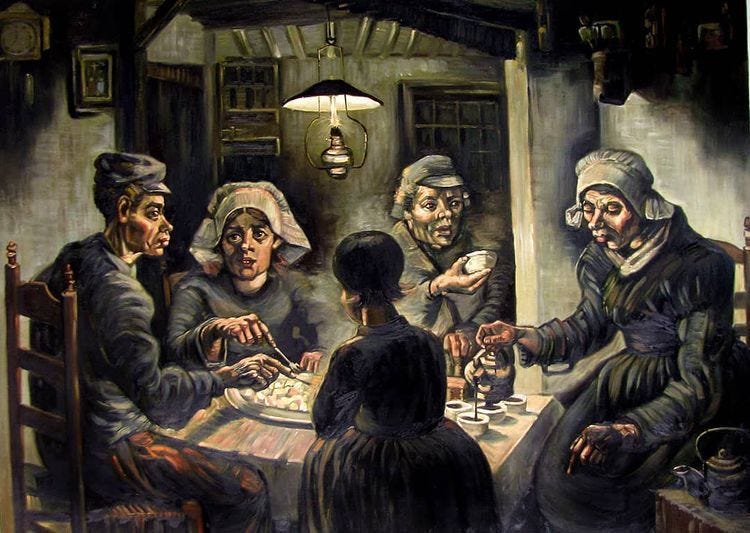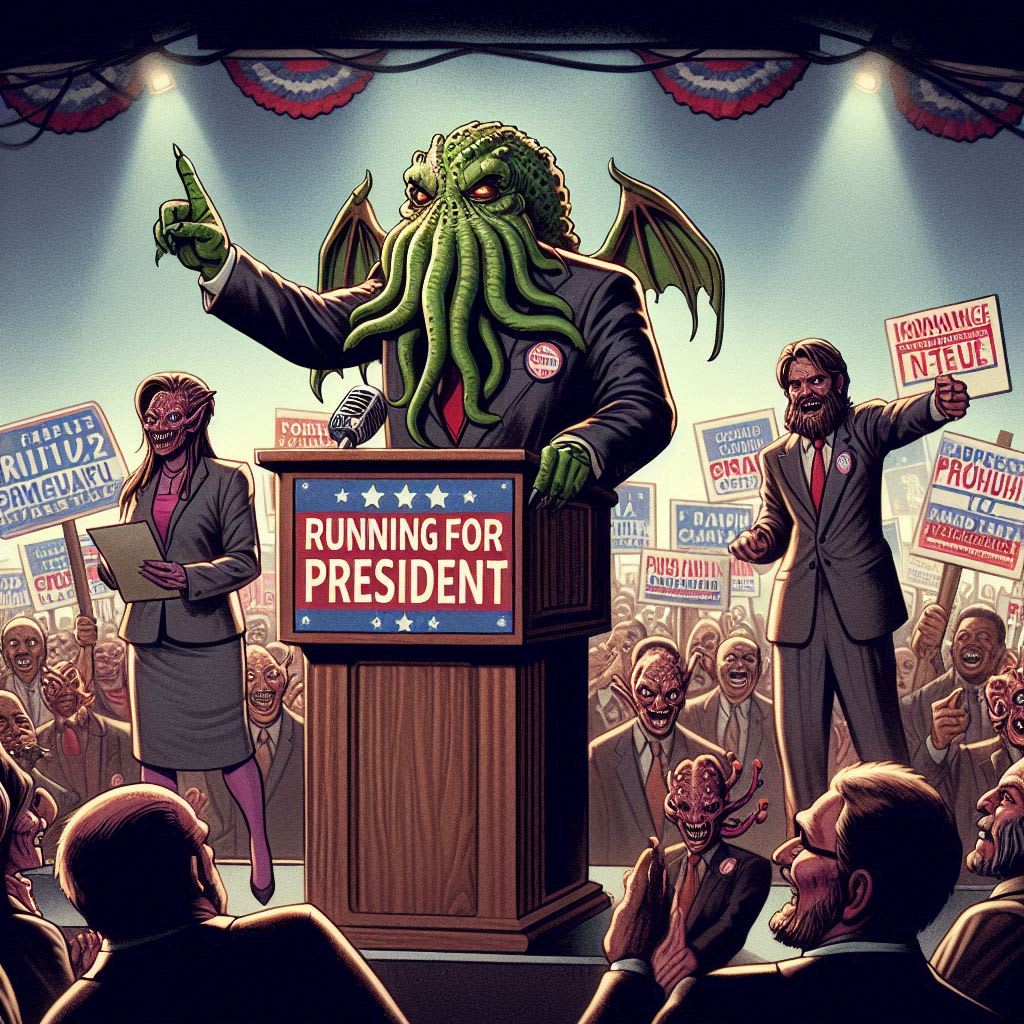What if People just stopped voting?
The Nothing Pizza of the European Elections
Europeans eating a nothing pizza.
In the great hubbub that followed the recent European Elections, you had to work hard to find one fundamental datum: the fraction of voters. I had to ask Perplexity to find it for me, and the good AI dug it out from a paragraph nearly at the end of this article: it was 51%.
As for the number of blank and null ballots, we have no data whatsoever. Zero — they do not exist. If it were counted, surely the Brussels Bunch couldn’t claim to have been elected by a majority of Europeans.
It also means that politicians (and not just European ones) are worried about the legitimacy of their position. That’s why they hide significant data about those who refuse to choose between stale cheese and rotten tomatoes on their pizza. The elections are becoming a big nothing pizza that changes nothing and signifies nothing.
Below, a comment that I wrote last week on my Italian blog. It refers to the Italian situation, but I think it will be interesting also for non-Italian readers.
What if People Just Stopped Voting?
From Ugo Bardi’s Blog. Translation by Deepl, revised by UB
Cthulhu for president. Why settle for the lesser evil?
Democracy is a good thing, in principle. And we think it is so important that we often feel justified in imposing it using carpet bombing. But, as time passes, the whole exercise of voting is becoming a mockery of itself. What kind of democracy is one where we can’t vote for peace and against genocide? Why can’t we vote against more weapons and more war? What sense does it make to choose between people who promise a lot but can maintain very little?
In 2009, the Berlusconi government signed an agreement with France to build four nuclear power plants in Italy. The announcement generated a lot of criticism, and I remember participating in a debate on the subject with some government representatives. Some people in the audience raised objections, asking the government representatives to justify it or at least debate its appropriateness with the audience. The response was that the government had no intention of justifying their decision or debating anything. The people had elected them, and the people knew what they were going to do. They were doing exactly that. At most, they would provide a public explanation of the benefits that nuclear power plants would bring to Italians.
The debate continued in the newspapers, and someone pointed out that nowhere in Berlusconi's party's election program did it say four power plants would be built. It only said that Italy would engage in international research projects on nuclear energy. The answer from the government was that voters knew their intentions, even if they were not written in the program. And, in any case, once you have been elected, you can do whatever you want because you have been elected.
Then came the Fukushima disaster in 2011, probably a divine punishment against such arrogance, and the nuclear plants were not built. But the story is a good indication of how democracy is understood today. People are elected, but the choice is within an extremely limited pool of candidates, who then can safely do as they please. If a leader decides to commit the country to war or genocide, voters cannot stop him or her.
Curiously, this system increasingly resembles that of the Catholic Church: the Pope is democratically elected by the conclave of bishops, but once elected, he immediately acquires the supernatural power of being infallible when he speaks “ex-cathedra.” Our government politicians have not yet proclaimed that they are infallible, but it seems to me that they are getting close.
On the degeneration of the Western system of government, it is worth reading Emmanuel Todd's comment. He is a French intellectual who can still afford to criticize some of the West's founding myths (not all of them, though). In his recent book, “The Defeat of the West,” he acutely describes how the concept of democracy, so important as to justify its imposition by carpet bombing, has become an empty shell that serves only to cheat the people.
From “La Défaite De L'Occident” by Emmanuel Todd, 2024. (p. 153 translated by Deepl, revised by UB).
The peculiarity of Western oligarchies is that their institutions and laws have not changed. Formally, they are still liberal democracies, with universal suffrage, elected parliaments and sometimes presidents, and a free press. Democratic customs, however, have disappeared. The more educated classes consider themselves inherently superior, and the elites, as we have said, refuse to represent the people, who are relegated to behaviors termed “populist.” It would be a mistake to believe that such a system can work harmoniously and naturally. The people remain literate and the basis of universal suffrage, superimposed on the new educational stratification, is still alive. The oligarchic dysfunction of liberal democracies must therefore be ordered and controlled. What does this mean? Simply that, with elections still in place, the people must be kept out of economic management and wealth distribution. In a word, cheated. This is the daily work of the political class, indeed it has become its priority. Hence, the hysteria about racial and ethnic issues and the useless chatter about serious topics such as ecology, the condition of women, and global warming,
These features have a negative connection to geopolitics, diplomacy, and war. With their hands full with their new profession--winning elections, which are no longer just theatrical performances but, like real theater, require specific skills and hard work--members of the Western political classes no longer have time to learn how to handle international relations. As a result, they arrive on the world stage lacking the necessary background knowledge. Worse, accustomed to triumphing over the less educated at home, laboriously but more often than not successfully (that's their job), and believing themselves confirmed in their inherent superiority, they come up against real opponents whom they can hardly impress and who have had time to think about the world and, it must be said, didn’t have to spend as much energy preparing for the Russian elections or the internal balance of power in the Chinese Communist Party. We are beginning to see the real technical inferiority of Joe Biden or Emmanuel Macron in the face of Vladimir Putin or Xi Jinping, and to understand the reasons why.
As a consequence, there is an ongoing debate in Italy and everywhere else in the world about whether we should stop accepting this scam and proclaim it by stopping going to the polls. There used to be a way of doing that by leaving a blank ballot in the ballot box, but it has not worked because they have stopped counting blank ballots. The same goes for “void” ballots, largely void because voters fill them with insults and obscene drawings; or they vote for Putin or Bozo the Clown, or perhaps they actually write “Chthulu” on the ballot. So, the next step could be to refuse to vote. Would it have any effect?
The idea of not voting is to delegitimize the whole gang that holds power today. But even if it is the choice of a large majority of voters, it will change little. At the very least, the non-voters will be subjected to a campaign of denigration similar to those launched against other anti-something (anti-vaxxers, anti-masks, etc.) that will define them as irresponsible idiots whose opinion is worthless. They could also use the same trick they used with the blank ballots: stop reporting the number of voters, releasing only percentage data.
Even now, being elected by a minority does not seem to upset our representatives too much. How small would this minority have to be for them to admit at least that they do not represent the people? It only takes a relative majority to be elected, and if only one person votes, then a representative can be elected with one vote, and 100% of the total. A landslide! Do you think he/she would be ashamed? Knowing our politicians, I think not.
It is hard to think we could achieve anything useful by not voting. At best, we could delegitimize the current gang that rules Western governments, but what would replace them? History teaches us that democracies have a limited life span, then they tend to be replaced by systems with a strong man at the top who goes by the name of King, Emperor, Duce, Führer, Father of the People, Our Dear Leader, and things like that. In many ways, it is an inevitable development to prevent the oligarchs from tearing the state apart and devouring it bit by bit. The strong man at the top is also seen by the poorest as a last-ditch defense against the oligarchs who mercilessly exploit them.
Is this our destiny? Probably yes, and, in fact, we are already seeing democracies gradually taking on the characteristics of a system based on a strong man at the top. Is a different future possible? Hard to say, but things do change. If you have a moment, try reading up on the concept of the “Network State,” developed by Balaji S. Srinivasan. The new state would no longer be based on a democratic system or a strong man at the top but on a network held together by artificial intelligence and blockchain. It is a very articulate and complex proposal that takes time to understand and digest. Whether it will come true is impossible to say at the moment. It is even more impossible to say whether it would be a good thing if it were to come true. In any case, everything that happens, happens because it had to happen.





I think it's better to vote for the parties they don't want you to vote for.
the rules (="It only takes a relative majority to be elected" i.e. election results are 100% valid and legal only if just 10 people vote) are what they are, and are extremely simple to understand.
If this system, however dull it may be, gets replaced by strong men is primarily thanks to those who don't understand, or refuse to accept that reality: for ALL practical purposes, not voting is practically the same thing as voting for the bigger parties, since it increases their percentages. It's math, plain and simple.
People who didn't vote this week in EU contributed to give more seats to the parties that got more votes in each country "won" just as much as those who did cast valid votes for those parties. Again, not a judgment, just a reminder of simple math fact.
Quoting Travaglio, "Se domani becco un astenuto che frigna perché non cambia mai nulla e l’Europa non gli piace, giuro che gli metto le mani addosso."